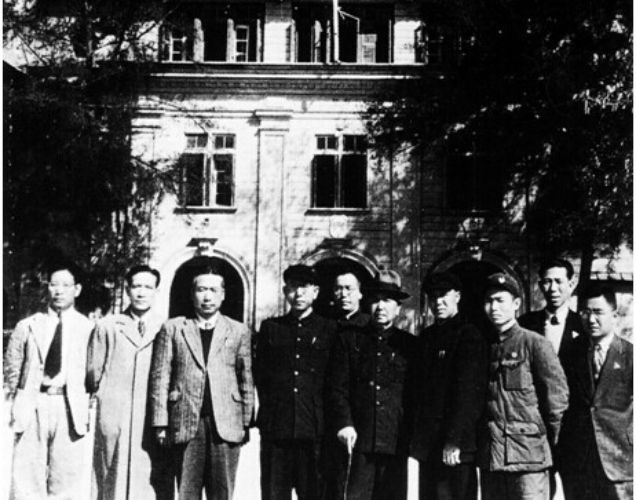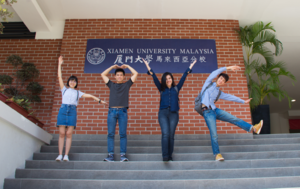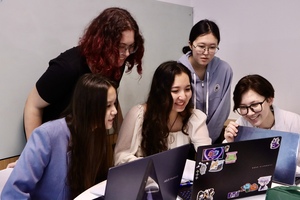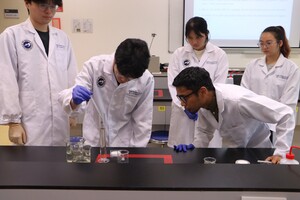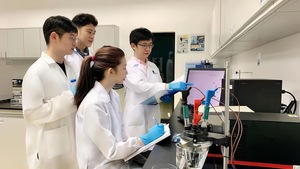- About
- Admissions
-
Academics
- Research & Innovation
- Campus Life
- Library
- More
Text
About the Programme
The Chemical Engineering (CME) programme at Xiamen University Malaysia (XMUM) is fully accredited by the Engineering Accreditation Council (EAC) Malaysia and recognised under the Washington Accord, ensuring international mobility and professional recognition for our graduates.
More than just transforming raw materials efficiently, the programme integrates core chemical engineering principles with emerging technologies to address global challenges in sustainability, energy transition, and digital transformation. In line with the Fifth Industrial Revolution (IR 5.0), the CME curriculum emphasises sustainability, resilience, and human-centric innovation, preparing students to design smarter, cleaner, and more sustainable processes.
Purpose-built around the theme of Smart & Sustainable Engineering, the curriculum equips students with the ability to apply Artificial Intelligence (AI) and green process design to enhance efficiency and environmental performance. Through a dynamic blend of lectures, laboratory sessions, and project-based learning, students develop strong technical expertise alongside innovative problem-solving skills essential for modern industries. With AI and sustainability principles seamlessly integrated across the curriculum, our graduates are empowered to design intelligent, resource-efficient, and future-ready engineering solutions. These capabilities open doors to high-growth sectors such as the circular economy, renewable energy and storage, and the development of smart systems and sustainable materials.
The programme is supported by state-of-the-art facilities, including Malaysia’s first Simulation Integrated Process Plant (SIPP), a handson training facility providing real-world exposure to process control, safety, and plant operation. Guided by a team of experienced academics and active researchers in sustainable process engineering, advanced materials, and AI-driven optimisation, the CME programme nurtures a new generation of chemical engineers ready to lead the green and digital transformation of industries worldwide.
Programme Highlights
- Accredited by the Engineering Accreditation Council (EAC) Malaysia and recognised under the Washington Accord for international professional mobility
- Curriculum designed for the Fifth Industrial Revolution (IR 5.0), emphasising sustainability, resilience, and humancentric innovation
- A curriculum integrating Artificial Intelligence (AI) and sustainability principles to deliver intelligent and ecoefficient engineering solutions
- Train at Malaysia’s first Simulation Integrated Process Plant (SIPP) for industry-relevant exposure in process safety and digital control
- Learn from experienced academic staff actively involved in AI-driven process optimisation, green materials, and sustainable process technologies
Career Opportunities
Chemical engineers and researchers in:
Energy and Process Industries:
Oil & Gas, Petrochemical, Refining, Renewable Energy, Carbon Capture & Storage
Bioproducts and Resource Industries:
Palm Oil, Oleochemical, Food and Beverage, Agricultural and Biotechnological Processing
Manufacturing and Advanced Materials
Semiconductors, Specialty Chemicals, Polymers, Smart and Green Materials
Environmental and Circular Economy Sectors:
Water and Wastewater Treatment, Waste-to-Resource Technologies, Chemical Recycling
Consulting, Finance, and Government:
Professional Consultancy, Sustainability and ESG Services, Risk and Insurance Assessment, Banking and Finance, and Regulatory or Policy Development
Research, Development, and Academia:
Innovation Centres, Universities, and R&D Institutions Advancing Green and Smart Technologies
Note: The degree is a unique multidisciplinary programme that integrates science and engineering knowledge into real-life applications. This programme is accredited by the Malaysian Qualifications Agency (MQA) but is not accredited by the Board of Engineers Malaysia
Entry Requirements
| Qualification | Requirement |
| STPM | A pass in STPM with at least a Grade C (GP 2.0) in Mathematics AND Chemistry/Physics |
| A-Level | A pass in A-Level with at least a Grade C in Mathematics AND Chemistry/Physics |
| UEC | A pass in UEC with at least a Grade B in 5 subjects including Mathematics, Chemistry AND Physics |
| Foundation / Matriculation (Science/in a relevant field) | A pass in Foundation/Matriculation with at least a CGPA of 2.0 out of 4.0 AND passes in Mathematics AND Physics |
| Diploma (in a relevant field) | A pass in Diploma with at least a CGPA of 2.5 out of 4.0 AND passes in Mathematics AND Chemistry/Physics |
| International Qualification | Any other academic qualification equivalent to or higher than the above as stipulated by MQA |
*For other equivalent qualifications, please consult our programme counsellor.
Main Courses
Text
- Chemical Engineering Drawing
- Introduction to Chemical Engineering
- Analytical Chemistry for Engineers
- Physical Chemistry
- Organic Chemistry
- Engineering Mathematics I & II
- Introduction to Biochemical Engineering
- Chemical Engineering Thermodynamics I
- Fluid Mechanics for Chemical Engineering
Text
- Unit Operations of Chemical Engineering I & II
- Chemical Engineering Thermodynamics II
- Heat Transfer
- Chemical Engineering Laboratory I & II
- Numerical Methods in Engineering
- Reaction Engineering
- Mass Transfer
- Materials Science for Chemical Engineering
Text
- Chemical Process Safety
- Chemical Process Technology and Design
- Process Control and Instrumentation
- Chemical Engineering Laboratory III
- Modelling and Simulation of Chemical Processes
- Plant Equipment Design
- Engineering Statistics and Optimisation
- Environmental Management
- Project Management and Economics
- Industrial Training
Text
- Research Project I & II
- Capstone Project I & II
- Engineers in Society
- Major Electives (Choose 4)
Text
Area 1 – Industrial Revolution 5.0 and AI
- Additive Manufacturing for Chemical Engineers
- Machine Learning for Chemical Engineers
- Computational Fluid Dynamics
- Multiscale Modelling and Simulation
Area 2 – Green and Sustainable
- Nanomaterials
- Sustainable Chemical Engineering and Circular Economy
- Emerging Bioprocesses Engineering
Area 3 – Engineering Technology
- Catalysis Technology
- Particle Technology
- Membrane Technology
- Oils and Fats Technology
Area 4 – Chemical Engineering Process
- Simulation Integrated Process Plant
- Crude Oil Refining and Processes
- Process Safety Management

